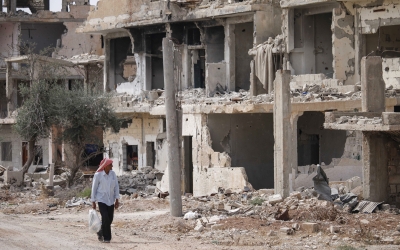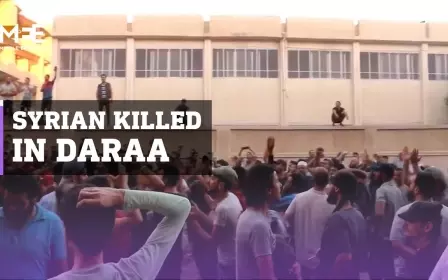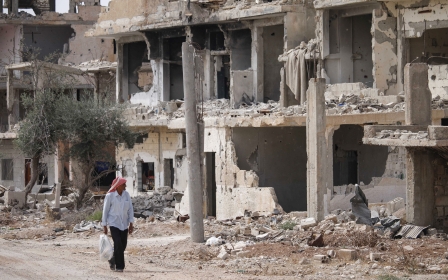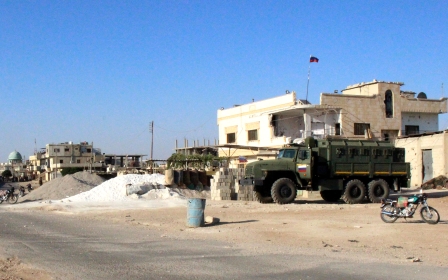Syria: Some rebels leave Daraa but siege continues after Russia truce falters
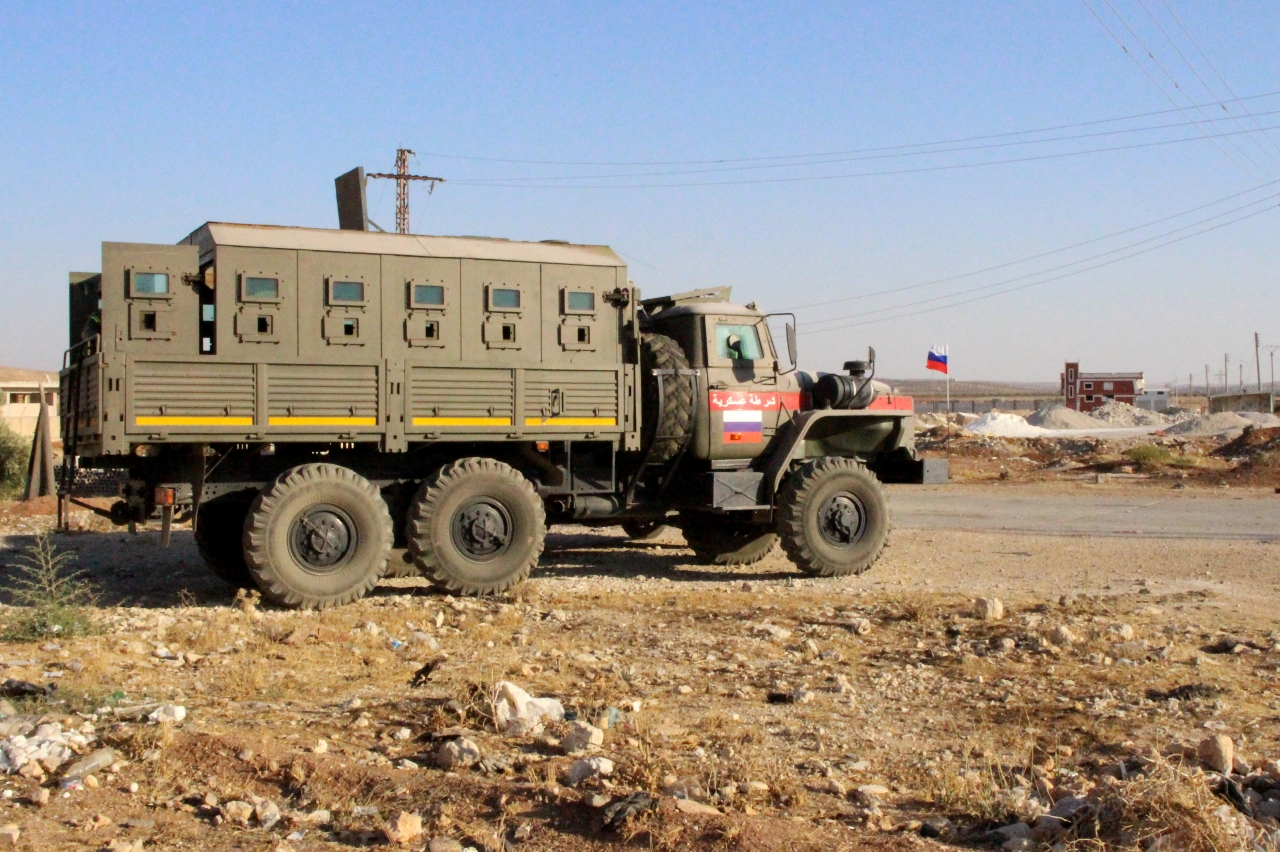
Buses carrying rebels and civilians from southern Syria arrived on Friday morning in Turkey-controlled northern Syria, but Russian-brokered talks aimed at ending the region's worst fighting in years appeared to have stalled.
The group was the second batch to leave the southern Syrian city of Daraa, and came a day after ongoing negotiations between the Syrian government and rebel representatives were punctuated by rocket attacks that killed civilians in the west of Daraa province.
New MEE newsletter: Jerusalem Dispatch
Sign up to get the latest insights and analysis on Israel-Palestine, alongside Turkey Unpacked and other MEE newsletters
Daraa, seen as the birthplace of Syria's uprising in 2011 and held for years by opposition forces, was returned to government control in 2018 under a previous Moscow-backed truce that had allowed rebels to stay in some areas of Daraa province.
However a low-level insurgency has been waged against government forces and rebels who signed reconciliation agreements with Damascus, with dozens of assassinations since 2020.
On Thursday, local media reported that four people, including former rebels who had reconciled with Damascus, had been killed in another unknown attack.
As negotiating efforts stalled, Iranian-backed Syrian government forces targeted the city of Tafas in the west of Daraa province on Thursday with rocket attacks - killing two women and wounding six people - in conjunction with the bombing of the city of Daraa.
“Civilians were in their homes and at work, and the situation was very normal," Zidan al-Hourani, an activist based in Tafas, told MEE.
"Suddenly more than 30 rockets rained down on the city without any reason.
“The rocket attacks were from three axes. About ten rockets fell on the main market, while the rest of the rockets were distributed throughout the city, causing great fear among the civilians.
"Civilians fled for fear of continuing attacks, and the city became empty. Civilian homes were destroyed because of the attacks. God help us," he added.
Defending their actions, government loyalists claimed that the attacks came in response to the targeting on Thursday of a government military vehicle on the road to the city of Nawa.
They said that the attackers, who were unknown, fled to Tafas, even though it is located around 30km away from the place of the attack.
Strained negotiations
Since late June, local armed groups have exchanged artillery fire with government forces and Damascus has imposed a crippling siege on the city's southern districts of Daraa al-Balad, seen as a hub for former rebels.
Russian security officers, along with representatives of the Syrian intelligence services, have been participating in negotiations with the local committees, which speak for residents and former rebels.
'There are no guarantees that the Fourth Division or pro-Iranian forces will withdraw if we leave the city'
- Muayyad Harfush, rebel leader in Daraa al-Balad
Russian efforts appeared to have halted an attempt to storm the enclave by pro-Iranian army units led by the elite Fourth Division who hold sway in the region and had in recent days tightened a two-month siege, escalating shelling and pushing for a military offensive.
However, talks have been strained amid attempts by forces loyal to Syrian President Bashar al-Assad and Iran to conduct a security operation under the pretext of searching for wanted persons as well as deploying military bases inside Daraa.
Russians remove checkpoint
On Tuesday, Russian military police, along with forces from the Eighth Brigade - comprised of former rebels supported by Moscow - had unexpectedly entered Daraa and removed a major military intelligence checkpoint that had been helping to uphold the siege.
The Russian military police were there to help oversee the transfer of some former rebels unwilling to reconcile with the government.
Hundreds of civilians gathered in front of the checkpoint to say goodbye to their relatives and celebrate the apparent end of the siege without pro-Iranian forces entering the city.
Major General Hossam Luka, the head of Syrian General Intelligence Directorate, appeared with Brigadier General Louay al-Ali, the head of the Military Intelligence Division, in rare scenes during the rebel transfer.
The two men seemed resentful of Russian troops removing the checkpoint.
However, after the Russian forces withdrew from the city along with the forces of the Eighth Brigade, members of the military security checkpoint opened fire on the civilians to disperse them, killing one civilian and wounding five others.
Despite the violence, state media reported on Thursday that two buses had entered Daraa to transport rebels to northern Syria.
Local media loyal to the opposition said on Friday that 79 people had arrived in northern Syria, including women and children
Syria's official Sana news agency said that "45 terrorists and some of their family members" had left Daraa in what it called a step "towards ending terrorist control over the district and towards the return of all state institutions and services".
State media regularly uses the term terrorist to refer to opposition fighters.
The transportation comes two days after an initial group of opposition fighters boarded buses to take them to rebel-held territory in the north.
'There are no guarantees'
Pro-government media claimed that two rebel leaders, Muhammad al-Masalma and Muayyad Harfush, had refused to leave for northern Syria, which had led to the failure of Tuesday's truce and the return of the siege of the city.
However, Harfush denied the allegations, telling MEE that the agreement had provided for himself and Masalma to be transferred to the city of Busra al-Sham, in the west of Daraa province, rather than northern Syria where he did not want to go.
'Fifty thousand civilians have been besieged [in Daraa] since June. Heavy bombardment has led to the displacement of 37,000 people'
- James Kariuki, UK ambassador to United Nations
"The agreement provided for the withdrawal of the [Syrian army's] Fourth Division, in conjunction with the removal of checkpoints to end the siege, but we were surprised that pro-Iranian forces did not withdraw from the city perimeter, so we cannot leave the area at all," he said.
"There are no guarantees that the Fourth Division or pro-Iranian forces will withdraw if we leave the city.
"Now the negotiators have postponed and skipped my transfer with al-Masalma to northern Syria, and to move forward with an agreement to deploy three Russian military bases in the city and withdraw the army."
A source close to the negotiating committee told MEE: "Negotiations have resumed, but pro-Iranian forces are creating obstacles that will disrupt access to a comprehensive agreement ending the siege.
"They insist on complex solutions, including entering the city by force and the arrest of some people.
"They demanded on Thursday to transfer more rebels to northern Syria to reach a new solution."
'Deeply concerned'
Daraa has now become a ghost town after weeks of intermittent fighting and shelling during which the army has prevented food, medical and fuel supplies coming in but opened a corridor for civilians to leave, residents and local officials say.
On Tuesday, the British Ambassador to the UN James Kariuki called for an end to the siege, saying the situation there was severe.
“The UK remains deeply concerned about the situation in Daraa," said Kariuki.
"Fifty thousand civilians have been besieged there since June. Heavy bombardment has led to the displacement of 37,000 people.”
Diana Semaan, a Syria researcher at Amnesty International, told MEE: "Many of the civilians and doctors I spoke to described the difficult humanitarian situation, including the impossibility of obtaining food and medical supplies.
"There is only one small medical point that was bombed. Civilians with chronic diseases are experiencing great difficulties in getting out and receiving treatment outside the besieged area.
"Traders are unable to introduce food, except for some smuggling operations that have doubled prices, amid the impossibility of entering humanitarian organisations.
"Amnesty International demands the lifting of the siege, allowing besieged and displaced civilians to move, and allowing humanitarian aid to enter the city, as soon as possible."
Middle East Eye delivers independent and unrivalled coverage and analysis of the Middle East, North Africa and beyond. To learn more about republishing this content and the associated fees, please fill out this form. More about MEE can be found here.



